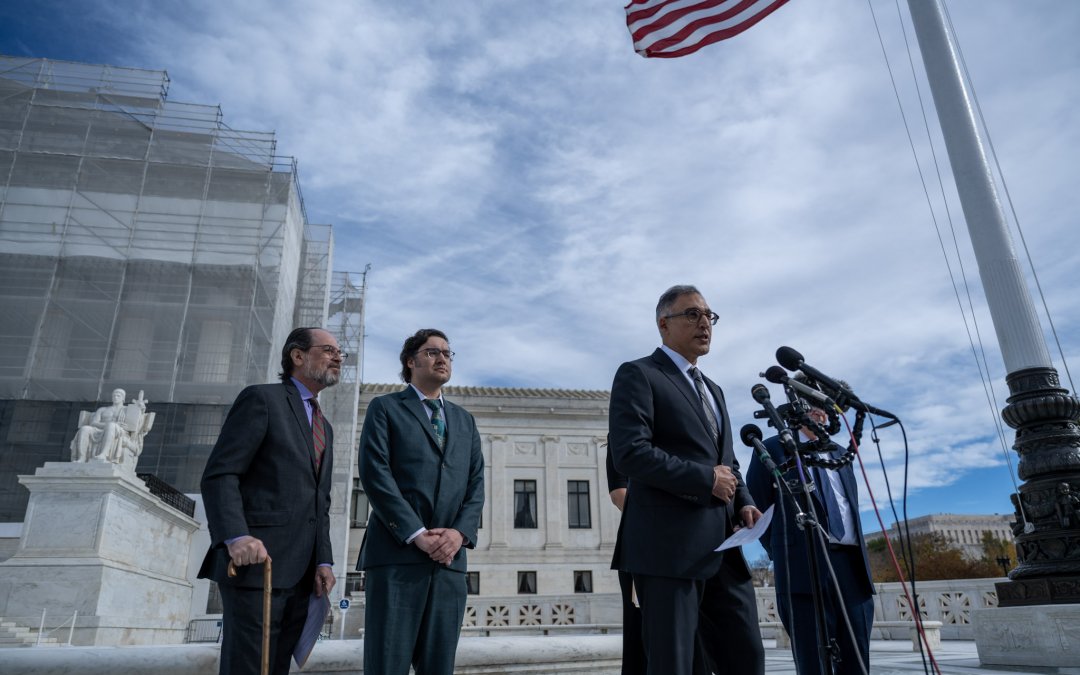WASHINGTON – Supreme Court justices sharply questioned President Donald Trump’s tariff agenda and appeared skeptical of its legality under the International Emergency Economic Powers Act (IEEPA) during oral arguments on Wednesday.
The consolidated cases were brought before the Court by small businesses—an educational toy company and wine importer—as well as a coalition of 12 states.
IEEPA grants the president the ability to regulate economic transactions after declaring a national emergency. While all presidents since Jimmy Carter have invoked IEEPA, they have done so to impose sanctions in response to specific national security threats. Trump is the first to rely on the Act to enact tariffs on imported goods.
Several justices expressed doubt regarding the president’s power to unilaterally impose tariffs, an authority traditionally held by the legislative branch according to Article I of the Constitution.
Justice Amy Coney Barrett questioned Solicitor General D. John Sauer on whether IEEPA provides either a statutory or historical basis to impose tariffs.
“Can you point to any other place in the Code or any other time in history where that phrase, together, ‘regulate…importation,’ has been used to confer tariff-imposing authority?” Barrett said.
Her question prompted back-and-forth dialogue with Sauer, who ultimately pointed to a “contested application”—as described by Barrett—in the Trading with the Enemies Act (TWEA).
The authority question raises the applicability of the major questions doctrine, which holds that Congress must provide explicit congressional authorization before the executive branch takes actions of “vast economic or political significance.”
Chief Justice John Roberts, whose vote is expected to help swing the decision, contested Sauer’s claim that the major questions doctrine “does not apply here.”
Justice Sonia Sotomayor also said she “does not understand” the argument that “foreign powers or even an emergency can do away with the major questions doctrine.”
Sauer reiterated that the president imposed tariffs as a means to “regulate” imports and that their revenue-raising effect is “only incidental.”
Both conservative and liberal justices challenged Sauer on this point, with Sotomayor pointing out that IEEPA does not contain a statute permitting revenue generation “as a side effect or directly.”
“It’s been suggested that the tariffs are responsible for significant reduction in our deficit,” Roberts said. “I would say that’s raising revenue domestically.”
While Sauer contended against the idea that regulatory tariffs are “distinct” from taxes, Neal Katyal, a lawyer representing small businesses against the tariffs, argued the opposite.
Katyal described the president’s tariff agenda as resulting in “one of the largest tax increases in our lifetimes.” He also focused on the term “regulate” in IEEPA, its interpretation being a key point of contention among the parties.
“[IEEPA] uses ‘regulate,’ which Congress has used hundreds of times, never once to include tariffs,” Katyal said. “And that is why, even though presidents have used IEEPA to impose economic sanctions thousands of times, no president in IEEPA’s 50-year lifetime has ever tried to impose tariffs.”
Several competing amicus briefs also home in on this language. Zac Morgan of the Washington Legal Foundation (WLF)—a law firm and policy center that filed a brief against the imposition of tariffs—said that “this entire case is about what…‘regulate importation’ means.”
“‘Regulate’ and ‘importation’ are separated by 16 words, and all of those words involve compellence, voidance…the kind of things you would expect to see in a sanctions authority,” Morgan said.
According to Morgan, IEEPA is intended for imposing financial sanctions and quotas as opposed to conferring tariffs or “setting rates at whim.”
The American Center for Law and Justice (ACLJ) focused on different considerations in its brief, namely the limits of judicial review on the president’s international governance. The brief mentions a key phrase in Section 1701 of IEEPA, “any unusual and extraordinary threat,” which serves as a “trigger” for the emergency authority outlined in Section 1702.
“When we’re talking about the national and international decision making relating to IEEPA, the president is given more information than any of us can have in terms of intelligence,” said Nathan Moelker, senior associate counsel at the ACLJ. “In that context, judicial review of what constitutes an unusual, extraordinary threat doesn’t fit with how IEEPA is structured.”
More broadly, Moelker emphasized that this is not an “easy” case for justices to wrestle with as they “navigate specific statutory language.”
Trump took to Truth Social on Tuesday to reiterate the case’s importance for his economic agenda, referring to it as “LIFE OR DEATH for our Country.” He previously floated the idea of attending the arguments but backtracked earlier this week.
In attendance at the Court were Treasury Secretary Scott Bessent, U.S. Trade Representative Jamieson Greer and Commerce Secretary Howard Lutnick. Several lawmakers, including Senators Ed Markey (D-Mass.), Amy Klobuchar (D-Minn) and Mike Lee (R-Utah) were also present.
If the president’s tariffs are struck down by the high court, more than $100 billion in refunds may be issued to importers. A decision against Trump would also mark the Supreme Court’s most significant rebuke yet of his presidential authority in the second term.
A decision is expected by summer 2026, but the expedited nature of the case makes an earlier ruling possible.


